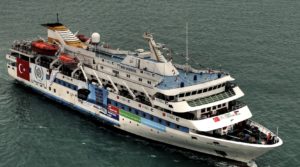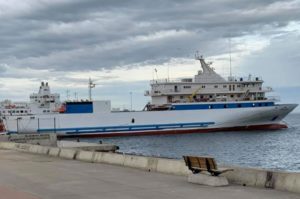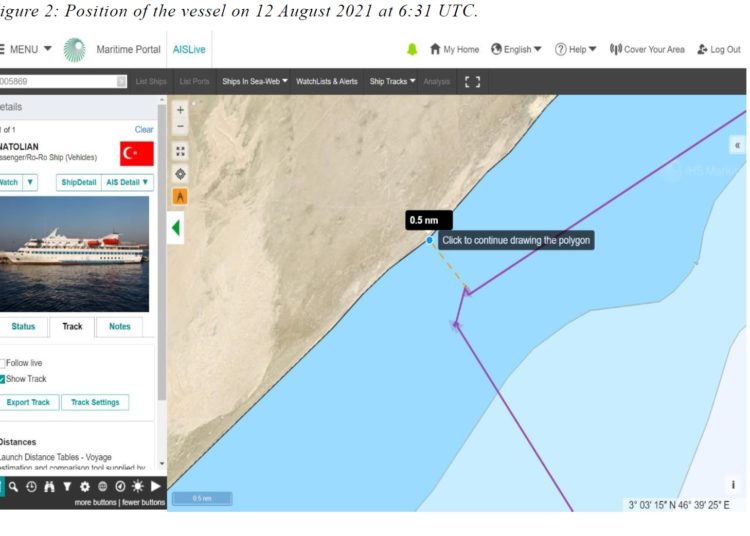Abdullah Bozkurt/Stockholm
The UN Panel of Experts on Somalia, which monitors illegal arms, said they are looking into a Turkish ship that was moored off a part of the Somali coastline controlled by the al-Shabab terrorist organization in August 2021.
The Anatolian, owned and operated by Mavi Deniz Taşımacılığı ve Sanayi Ticaret Limited Şirketi, an Istanbul-based company, remained stationary for about 24 hours less than 1,000 meters off the Somali coast in an area controlled by al-Shabab, according to vessel’s automatic identification system (AIS).
“That area is not patrolled by Somali security forces and Al-Shabaab has a stronghold 30 kilometres inland in a locality named Ali Gaudud (coordinates: 3°10’42″N, 46°26’9″E),” the UN investigators concluded. It appears that suspicions were raised about why the ship remained so close to the al-Shabab area and if it was delivering supplies or arms to the group.
The shipowners said they were victims of an attack by a skiff off the coast of Somalia on August 13, 2021 and that according to the captain, the ship was fired on with RPGs and small arms. Apparently not fully convinced of the story, the UN investigators sent an official letter to the Turkish company asking for clarification about why the ship sailed to waters close to the al-Shabab area and asked for detailed information on the circumstances of the attack.
The company had not responded to the UN inquiries by the time the report was submitted to the UN Security Council, on October 6, 2021. The Turkish government did not comment on the incident, either. The navigation chart shows that it departed Fethiye in Turkey’s southern province of Antalya and stayed close to the al-Shabab area from August 12 to 13, 2021.
UN investigators are looking into a Turkish ship that was anchored close to an al-Shabab controlled coastline in Somalia:
According to trade registry records reviewed by Nordic Monitor, the ship is owned by the family of a businessman named Erdal Tümsek. The company was originally registered in 2006 under the name of Koza Nakliyat Sanayi Тicaret Limited Şirketi and listed Yiğit Tümsek and Hamza Köseoglu as the owners. The company’s name was changed to Mavi Deniz Taşımacılığı ve Sanayi Ticaret Limited Şirketi in August 2018, and its owners were listed as Yiğit Tümsek and Mert Tümsek.
The company applied for bankruptcy protection in February 2019, which was granted by the court. Although the temporary protection was extended several times, the company eventually went bankrupt on September 15, 2021, according to the decision of a commercial court in Istanbul.
That means when the ship was sailing to Somalia, the company was under financial stress and bankruptcy protection and was registered as collateral against the company debts. Although the ship stayed in Mogadishu, a Turkish court sold it to another Turkish firm, 2E Denizcilik San. ve Tic. A.Ş., for 3.9 million Turkish lira in November 2021 as part of the liquidation of company assets to pay its outstanding debts.
A notice put out by the court described the ship as insured for $2 million, that all the equipment on the ship was in working order and that it only needed a crew to get back under sail. It projected a cost of $320,220 to tow it back to Turkey. The notice also mentioned that the ship had come under attack by pirates and that there were traces of the attack on the hull of the ship.

Interestingly enough the same ship was owned by al-Qaeda linked Turkish charity the Foundation for Human Rights and Freedoms and Humanitarian Relief (İnsan Hak ve Hürriyetleri ve İnsani Yardım Vakfı, or IHH) before it was sold to Koza in 2018. The IHH used it as the flagship of an aid flotilla in that attempted to breach Israel’s blockade of Gaza in May 2010. Relations between Turkey and Israel were damaged after the killing of nine Turks and one Turkish-American during Israel’s raid on the ship in which IHH militants clashed with the commandoes.
The ship had been anchored at a dock in Istanbul since 2010 until the IHH decided to sell it to the Tümsek family. Erdal Tümsek, the head of the family, issued a statement at the time on the purchase, saying the ship was very dear to him, that he considered it a veteran of war and that he did not want it to rust in the harbor. “We are proud of saving the veteran ship. We have prevented it from disappearing by buying it. It will serve our people as another means of transportation,” Tümsek said at the time.
The ship went through an overhaul, was turned into a freighter from a passenger vessel and was named Erdoğan Bey before it was renamed Anatolian.
Trade registry data for Mavi Deniz Taşımacılığı ve Sanayi Ticaret Limited Şirketi:
Over the years evidence has emerged to indicate that the IHH provided logistical support to various Islamist jihadist groups including al-Qaeda and the Islamic State in Iraq and Syria (ISIS). The first serious charges against the network of this highly controversial charity were filed by a Turkish prosecutor in January 2014 after a police investigation uncovered that the IHH had smuggled arms to al-Qaeda-affiliated jihadists in Syria.
The criminal investigation, conducted by a prosecutor in Turkey’s eastern province of Van, led to the IHH when wiretaps and surveillance revealed that the Kayseri and Kilis branches of the organization were sending funds and medical and household supplies to jihadists in Syria with the help of Turkey’s National Intelligence Organization (MIT), which is run by President Recep Tayyip Erdoğan’s close confidant, Hakan Fidan, an Islamist figure.
The prosecutor’s conclusion was that the NGO took part in the scheme knowing full well what it was involved in. It was not random or individual participation but rather a deliberate scheme with the knowledge of the IHH’s top management.
Fearing that an expansion of the probe could lead to senior figures in the IHH and expose the links to his government, then-prime minister Erdoğan quickly moved to quash it. The government dismissed and later arrested all the police chiefs and prosecutors who had uncovered the IHH’s clandestine dealings with jihadist groups.

The best depiction of the IHH’s clandestine work was provided by a top counterterrorism expert who had worked on terrorism for decades and investigated and monitored radical Islamist groups. At a hearing on August 16, 2016 Ali Fuat Yılmazer, former head of the police intelligence section that specialized in radical religious groups, testified that “the IHH campaigns are designed to provide aid for jihadists engaged in terrorism around the world and supply medical aid, funding, logistics and human resources for jihadists.”
Yılmazer added that he personally submitted detailed reports about the IHH’s terrorist links to Erdoğan when he was prime minister. “I also provided very comprehensive reports to the prime minister on this issue at the time. These reports are also filed in the archives of the [Turkish] state. It [the IHH] is one of the leading organizations when it comes to al-Qaeda activities around the world,” he said in court.
The IHH’s links to ISIS were proven in another court case. According to the testimony of a Turkish woman named Merve Dündar, the wife of ISIS militant Mahmut Gazi Dündar, both of whom were listed as suspected ISIS suicide bombers and placed on a watchlist, the IHH channelled logistical supplies to people who lived in ISIS-controlled cities and towns. “We were living in ISIS territory, and my husband wasn’t working in Syria. We were distributing [IHH-provided] supplies to the needy,” she told the court in a hearing on June 10, 2021.
Nordic Monitor previously reported that the IHH also sent arms to Islamist groups in Libya, using a ship to deliver humanitarian aid. The problems encountered by the ship while delivering arms were sorted out by Turkish diplomats posted to Libya.
A damning revelation of the IHH’s terrorist activities was made by Russia in 2016. According to intelligence documents submitted to the UN Security Council on February 10, 2016, Russian Ambassador Vitaly Churkin, the then-permanent representative to the UN, revealed Russian intelligence documents that even furnished the license plate numbers of trucks dispatched to Syria by the IHH loaded with arms and supplies bound for jihadist groups including the Nusra Front.












